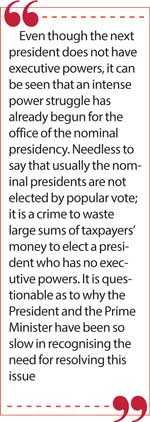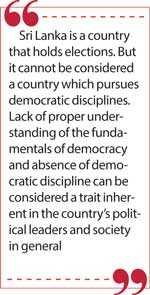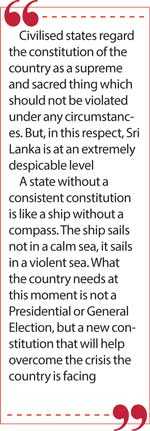Wednesday Feb 11, 2026
Wednesday Feb 11, 2026
Friday, 6 September 2019 00:25 - - {{hitsCtrl.values.hits}}

Although the 19th Amendment to the Constitution has removed the executive powers of the president, reducing his official status almost to a level of a nominal president, the failure to change the method of election of the president to suit his altered position has led to make the entire system of governance a confused mess and a ridiculous affair.
The Government of course, had a responsibility to educate the people, of the true nature of the changes made by the 19th Amendment in the presidential system of governance. It appears that the Government has deliberately kept it a secret from the people. The people did not know that the next president is going to be one with no executive powers. Even the candidates contesting the forthcoming Presidential Election did not know about it. Even now they do not seem to have a clear understanding of it.
If the president has no executive powers, why is that such a nominal president is elected by public vote, spending billions of rupees of public money? Economically, the country is not in a healthy state. It is in a state of near bankruptcy. How could a country in such a situation, justify spending huge sums of money to elect a nominal president with no executive powers?
Instead of taking timely measures to resolve this crucial issue relevant to the governance of the country, the government paid a blind eye to it, completely ignoring the issue. Even the opposition parties did not see it as an important problem to be resolved. Both the President and the Prime Minister have been reminded of the need for resolving it only when the Presidential Election is round the corner. Last week, there was a discussion about this issue between the President and the Prime Minister. However, the discussion the President had with the Leader of the Opposition in this regard has not been successful.
Fishing in troubled waters
Even though the next president does not have executive powers, it can be seen that an intense power struggle has already begun for the office of the nominal presidency. Needless to say that usually the nominal presidents are not elected by popular vote; it is a crime to waste large sums of taxpayers’ money to elect a president who has no executive powers. It is questionable as to why the President and the Prime Minister have been so slow in recognising the need for resolving this issue.
By now two contestants have announced their candidacy while selection of the UNP candidate has become a matter of life and death. Even though the next president will be only a nominal head of state with no executive powers, it seems that no one aspiring to contest the Presidential Election is prepared to give up the idea of contesting. Obviously they are not concerned with the huge wastage of money to the country except for satisfying their grand ambitions and vain glories.
It is not difficult to understand that it is not for the common good of the country but for their own personal interests that the President and the Prime Minister, who did not take any initiative to settle this issue in advance without letting it go too far, are now so keen in settling it at the last minute.
The present confusion of this issue can lead to greater chaos in the future. The three main pillars of power of the State of Sri Lanka, namely the Executive, the Legislature and the Judiciary, are not in a cohesive position; they presently stand at a deteriorating level. Although the next president will not have executive powers vested in him by the Constitution, in view of the fact that the Executive, the Legislature and the Judiciary are not in a cohesive position, the person elected as the president by popular vote, if he is able to bring all three or two of the main pillars of power under his command, stands a chance to establish a dictatorial control over the country. If such an eventuality occurs, inevitably the country will fall out of the frying pan into the fire.
Letting the errors aggravate
Sri Lanka is a country that holds elections. But it cannot be considered a country which pursues  democratic disciplines. Lack of proper understanding of the fundamentals of democracy and absence of democratic discipline can be considered a trait inherent in the country’s political leaders and the society in general. This is not something new to the country. It can be considered a characteristic that has prevailed since independence. Disrespect for law of the country by the rulers or the society at large is another serious issue that the country is facing today.
democratic disciplines. Lack of proper understanding of the fundamentals of democracy and absence of democratic discipline can be considered a trait inherent in the country’s political leaders and the society in general. This is not something new to the country. It can be considered a characteristic that has prevailed since independence. Disrespect for law of the country by the rulers or the society at large is another serious issue that the country is facing today.
Parliament can be regarded as the main body that enacts laws for the country. It is also the main institution that monitors the implementation of the law of the country. Members of Parliament are prohibited from doing business with the State. It is a fundamental principle strictly enforced not only in Sri Lanka but in almost all countries where democratic system of governance is in practice.
But for more than 40 years, Sri Lankan parliamentarians have been doing business with the government, not stealthily, but in public. The Parliament has never attempted to rectify this error except for adopting a policy that supports and encourages it. When we informed the Speaker about it, the Speaker informed us that he does not have the statutory authority to look into it. Then we complained this issue to the Supreme Court in the form of a petition signed by 64 of us. The policy the Supreme Court may adopt in this regard is not clear.
Subsequent to our petition to the Supreme Court, MP Ranjan Ramanayake revealed to the media that there are more than 100 MPs holding bar licenses; there are four MPs possessing ethanol licenses; more than 75 MPs have permits for sand business. There are 14 MPs operating shops in the airport. How ugly will be the picture of parliamentarians when you add the number MPs who have obtained State land, re-export permits and licenses for running filling stations, to the list of MPs doing business with the State? What can we as citizens do if both the Parliament and the Judiciary do not look into this issue and rectify the error when it had been brought to their notice?
We could have avoided the country being plunged into a sordid situation like this, if we had, in addition to the right to vote in elections, the other means operative in several other countries enabling the citizens to intervene decisively in public administration such as the system of “popular sovereignty” and “popular referendum”, two democratic mechanisms operative in the constitution of Switzerland. Unfortunately even the knowledge of our citizens on such measures is scarce.
Uncivilised State
Civilised states regard the constitution of the country as a supreme and sacred thing which should not be violated under any circumstances. But, in this respect, Sri Lanka is at an extremely despicable level.
The 19th Amendment can be cited as an instance to demonstrate the depth of bankruptcy of Parliament which can be considered the main law-making institution, as far as legislation is concerned and the extent to which the Constitution, the supreme law of the country, had been violated in enacting laws.
According to the Constitution, the basic structure of the Constitution can be changed only if it is approved by a referendum in addition to the two-thirds approval of Parliament. However, the first draft of the 19th Amendment had been prepared in such a manner that the executive powers vested in President were to be removed making him a nominal president and transfer the executive powers to the cabinet of ministers presided over by prime minister, only with the approval of two-thirds majority in Parliament without the approval of a referendum. However, the Judiciary did not approve the draft Bill. The Court advised that some changes in the draft Bill could be made only by two-thirds approval of Parliament without a referendum, but some changes it emphasised should be approved by a  referendum in addition to the two-thirds approval of Parliament. Despite the decision of the Judiciary, Prime Minister Ranil Wickremesinghe managed to pass a Constitutional Amendment to abolish the executive powers of the president without a referendum and have the executive powers transferred to the Cabinet of Ministers headed by him. Perhaps, this can be considered the biggest scam so far in the history of constitution making in the world. All MPs who knowingly or unknowingly endorsed this scam including the President should be held responsible for it. Both the ruling party and the Opposition parties, all are responsible for this. Strangely, no one went to Court against this unconstitutional legislation.
referendum in addition to the two-thirds approval of Parliament. Despite the decision of the Judiciary, Prime Minister Ranil Wickremesinghe managed to pass a Constitutional Amendment to abolish the executive powers of the president without a referendum and have the executive powers transferred to the Cabinet of Ministers headed by him. Perhaps, this can be considered the biggest scam so far in the history of constitution making in the world. All MPs who knowingly or unknowingly endorsed this scam including the President should be held responsible for it. Both the ruling party and the Opposition parties, all are responsible for this. Strangely, no one went to Court against this unconstitutional legislation.
The dispute was brought to Court only when the President attempted to overthrow the Prime Minister Ranil Wickremesinghe’s Government, replace it with a government headed by Mahinda Rajapaksa and dissolve the Parliament. In this instance, the Judiciary was concerned only on the aspect of whether the President’s action was in keeping with the law or not according to the existing Constitution. Perhaps, the Judiciary may not have had any other option. However, the decision of the Court offered legal recognition to the 19th Amendment which was approved contrary to the Constitution.
Constitutional violations
President Maithripala Sirisena was not the first to violate the Constitution. President Jayewardene, the creator of the Second Republican Constitution, violated the Constitution on number of occasions using his five-sixths majority in Parliament to achieve his narrow and selfish political aspirations. By doing that, he distorted the system of governance and the Constitution that he himself introduced.
Of the distortions made during the regime of J.R. Jayewardene, the Fourth Amendment made to extend the official term of Parliament by a referendum can be considered the most draconian amendment made to the Constitution. It can be described as an amendment which pushed the country into a path of bloodshed. Like J.R. Jayewardene, Chandrika Kumaratunga did not have enough parliamentary power to achieve her narrow political ambitions through constitutional amendments. She, however, managed to achieve her purpose by taking the Head of the Judiciary under her command and getting him to pass a verdict in violation of the Constitution.
The system of executive presidency had been designed to ensure the number of seats won by a political party at the general election remains unchanged throughout the official term of Parliament and until the next election. MPs were not allowed to change the political party in between without losing their parliamentary seats. The vacancies occurred between two elections were filled by appointing another member of the same party in which the vacancy had occurred. This system had been designed to prevent the overthrow of governments caused by MPs changing their political parties which is a common occurrence in a parliamentary system of governance. It can be said to be an important foundation laid down for healthy survival of the system of governance established by the Second Republican Constitution. President Chandrika Kumaratunga with the support of the Judiciary (Chief Justice Sarath Nanda Silva) completely demolished the very foundation of the system of governance. The Judiciary helped to create a system for UNP MPs who had joined the Government to change their party without losing their seats. It not only created a distortion in the Constitution but also a system in which the MPs could demand large sums of money to support the weak governments in power.
President Mahinda Rajapaksa too, amended the Constitution arbitrarily, using the two-thirds majority he had in Parliament. He not only abolished the 17th Amendment and established a system so that he could interfere with the Constitutional Council and the Independent Commissions, but also introduced a system in which the executive president could contest any number of terms instead of two terms prescribed by the Constitution.
The illegal and arbitrary policy pursued by the Rajapaksa regime to oust Chief Justice Shirani Bandaranayake can be considered one of the worst constitutional violations of that period. The Writ Ordinance is the most powerful weapon used in civilised world to correct an error likely to happen in administration or lower courts; even the most powerful kings of England respected the writ Ordinances. The Parliament of Sri Lanka did not honour the order issued by the Court of Appeal prohibiting the arbitrary investigation carried out by the Parliamentary Select Committee (PSC) against the Chief Justice Shirani Bandaranayake. Perhaps this may be the only occasion a parliament had callously disregarded a Writ issued by a Court of law.
The violation of the Constitution is not a feature that can be seen only after 1977. The Acts of Parliament passed depriving the citizenship rights of Indian plantation workers, even before the ink on the Soulbury Constitution was barely dry and the Sinhala Only Act, introduced in 1956, depriving the dignity of Tamil-speaking people and making them second-class citizens, can be considered as the Acts passed against the Soulbury Constitution.
Not rectifying errors
Generally, any civilised state treats the constitution as an entity that is supreme and sacred which should not be desecrated under any circumstances. Violation of the constitution by heads of state, by legislature or the judiciary are heard of very rarely or not at all in civilised states. If any violation occurs in a very rare occasion in civilised countries, appropriate measures will be taken to rectify it as soon as possible.
For instance, the 42nd Amendment to the Indian Constitution made during the regime of Indira Gandhi in 1976 distorted the shape of the Indian Constitution. India did not allow it to take root in the Constitution. The Janatha Government that came to power subsequently enacted the 43rd Amendment to restore the Constitution by removing the deformity caused by the 42nd Amendment. The Congress Party too supported the amendment.
The number of instances in which the Constitution of Sri Lanka has been violated by the Heads of State with the support of the Legislature, and in some instances with the support extended to the Head of State by the Judiciary is significant. However, at no time, has any government acted to restore the Constitution by repealing the amendments that had led to distort the constitution. At least, there was no dialogue in this regard. The extent of the civility of political culture in our country can be judged accordingly.
The situation that prevails in the Judiciary is similar. The verdicts that led to the violation of the Constitution have not been dismissed or repealed yet. Sri Lanka is democratic only in its outward appearance. Sri Lanka has not been able to adequately cultivate the knowledge and discipline required for a system of democratic government.
The main problem of the country
Ours is a Constitution severely corrupted by persistent abuses, deprived of proper order, cohesion and consistency and distorted to a point where it can no longer be used. Consequently, what we have inherited now is a confused system of governance without a proper order. A state without a consistent constitution is like a ship without a compass. The ship sails not in a calm sea, it sails in a violent sea. What the country needs at this moment is not a Presidential or General Election, but a new constitution that will help overcome the crisis the country is facing.
The new constitution should not be an old-fashioned constitution made by the members of the Legislature only. Instead, it must be a people’s constitution framed with their fullest participation. It should be a product of a constitutional process aimed at building the Sri Lankan nation, eliminating the recognition of ethnic, caste and religious discriminations, safeguarding the interests of all oppressed and most vulnerable social groups and ensuring human respect, dignity and equal rights for all, irrespective of differences.
Similarly, the new constitution should not restrict the exercise of the sovereignty of people only to right to vote at the elections, instead, the scope of it should be expanded to include the rights to “popular sovereignty” and “popular referendum and the right to recall the elected representatives as being practiced in developed countries like Switzerland.
If the public wants, the forthcoming Presidential Election held to elect a nominal president can be turned into an election to prepare a fertile ambience for making a people’s constitution.